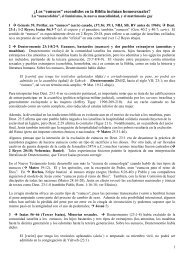Deuteronomy: - Fundación Otras Ovejas de Argentina
Deuteronomy: - Fundación Otras Ovejas de Argentina
Deuteronomy: - Fundación Otras Ovejas de Argentina
Create successful ePaper yourself
Turn your PDF publications into a flip-book with our unique Google optimized e-Paper software.
� un<strong>de</strong>r Josiah (640-09 BC), with the centralization of the cult in the Temple, many Levites from other towns<br />
emigrated to Jerusalem; � Jesus and Paul, single and itinerant.<br />
1.3 Slaves (‗ebed). References to slavery are common in <strong>Deuteronomy</strong> (26 times total), but they refer to<br />
something different than mo<strong>de</strong>rn racist slavery, since slavery neither had no racist basis, nor was it perpetual:<br />
12 If a member of your community, whether a Hebrew man or a Hebrew woman, is sold to you and works<br />
[„abad, as a slave] for you six years, in the seventh year you shall set that person free. 13 And when you<br />
send a male slave out from you a free person, you shall not send him out empty-han<strong>de</strong>d. 14 Provi<strong>de</strong><br />
liberally out of your flock, your threshing floor, and your wine press, thus giving to him some of the bounty<br />
with which Yahweh your God has blessed you. 15 Remember that you were a slave [„ebed] in the land of<br />
Egypt, and Yahweh your God re<strong>de</strong>emed you; for this reason I lay this command upon you today. 16 But if<br />
he says to you, ―I will not go out from you,‖ because he loves you and your household, since he is well off<br />
with you, 17 then you shall take an awl and thrust it through his earlobe into the door, and he shall be your<br />
slave forever. You shall do the same with regard to your female slave. 18 Do not consi<strong>de</strong>r it a hardship<br />
when you send them out from you free persons, because for six years they have given you services worth<br />
the wages of hired laborers [sakar]; and Yahweh your God will bless you in all that you do. (Deut. 15:12-<br />
18).<br />
What such slavery had in common with perpetual slavery (that of the Israelites in Egypt) and recent racist slavery<br />
was that the slave‘s body belonged to his/her owner, not only for work in the household and in the field, but also<br />
for sexual and procreative use. (See Sarah, who gave her slave Hagar to her husband Abraham as his concubine,<br />
Gen. 16:1-4; � Deut. 28:68; Colossians; Ephesians; Philemon.)<br />
Nevertheless, for the most part the references to slavery in <strong>Deuteronomy</strong> anticipate liberation after seven years and<br />
represent another dimension of concern for society‘s weak and poor. The paradigm of the Exodus, the oppression<br />
of the Israelites as slaves in Egypt, is continually given as a motive for liberating justice and loving solidarity:<br />
12 Take care that you do not forget Yahweh, who brought you out of the land of Egypt, out of the house of<br />
slavery…. 20 When your children ask you in time to come, ―What is the meaning of the <strong>de</strong>crees and the<br />
statutes and the ordinances that Yahweh our God has comman<strong>de</strong>d you?‖ 21 then you shall say to your<br />
children, ―We were Pharaoh‘s slaves in Egypt, but Yahweh brought us out of Egypt with a mighty hand‖<br />
(Deut. 6:12, 20-21).<br />
8 It was because Yahweh loved you and kept the oath that he swore to your ancestors, that Yahweh has<br />
brought you out with a mighty hand, and re<strong>de</strong>emed you from the house of slavery, from the hand of<br />
Pharaoh king of Egypt (Deut. 7:8; see also 8:14; 13:5, 10; 16:12; 24:18, 22).<br />
Female and male slaves should rejoice in the festivities in the presence of Yahweh in Jerusalem, along with their<br />
owners‘ sons and daughters and the Levites, as members of God‘s people (12:12, 18; see the festivities of<br />
Pentecost, 16:11-12, and tabernacles, 16:14).<br />
In addition to the references to literal slaves as a vulnerable class, other texts metaphorically refer to all of Israel as<br />
―slaves‖ of Yahweh (32:36, 43), all of Pharaoh‘s officials as his ―slaves‖ (29:2; 34:11), the patriarchs Abraham,<br />
Isaac and Jacob as servants of Yahweh (9:27)—and Moses as Yahweh‘s unequaled ―slave / servant‖ (34:5, 10-11;<br />
� Second Isaiah; Philippians 2).<br />
1.4 Orphan (yathom); 11 times in <strong>Deuteronomy</strong>, always followed by ―widow,‖ since the orphan has a<br />
mother, but is missing his/her father (see texts un<strong>de</strong>r 1.5 Widow/s); � Ex. 22:21, 23; Psalms (10:14, 18; 68:6;<br />
82:3; 94:6; 109:9,12; 146:9); Job (seven occurrences); total 42 times in the Hebrew Bible. � James 1:26-27;<br />
John 14:18.<br />
8

















